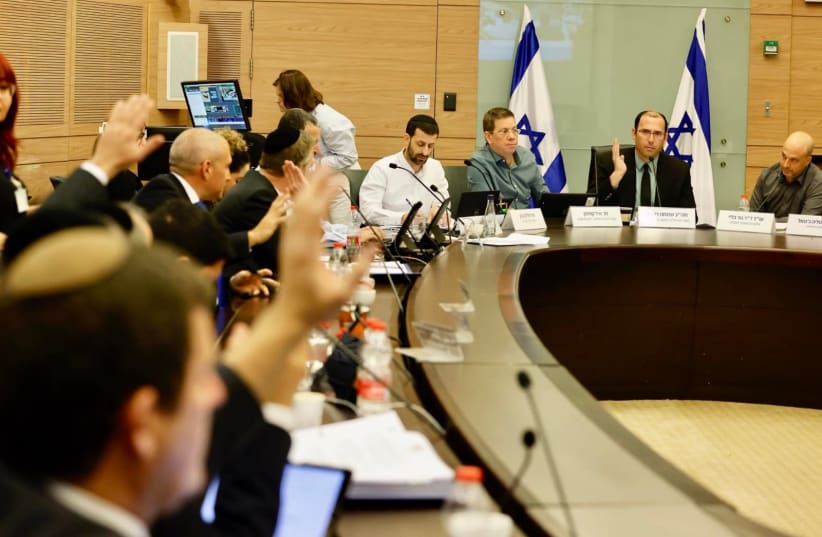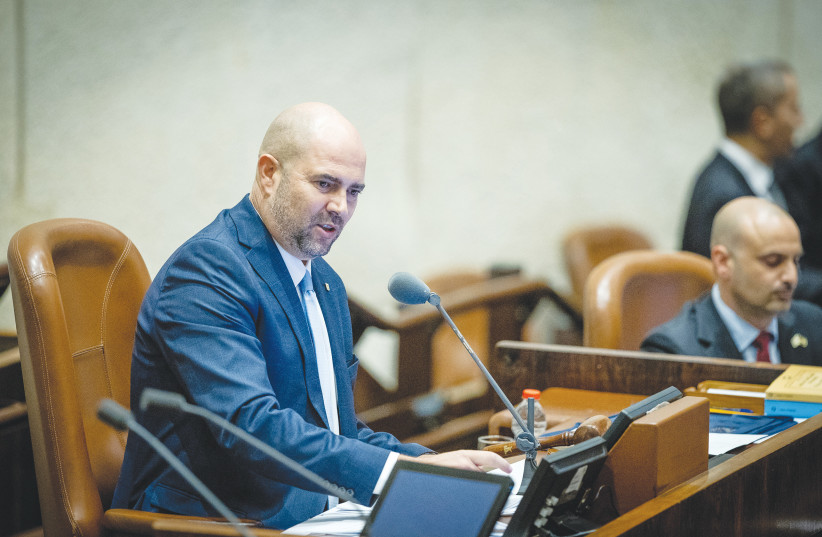The confidential Knesset vote to choose the legislature’s two spots on the Judicial Selection Committee will be held on June 14, Knesset Speaker MK Amir Ohana (Likud) announced late Monday night, at what could be a crucial moment in the ongoing talks at the President’s Residence between the coalition and opposition over the government’s proposed judicial reforms.
The makeup of the committee, which elects judges for Israel’s entire court system, including for the Supreme Court, is one of the most contested issues between the coalition and opposition in negotiations. The coalition wishes to give itself a majority in the committee and thus control judicial appointments, while the opposition claims that this will politicize the courts and harm the judicial system.
Ohana’s announcement indicates that the coalition will form the committee based on the existing makeup, and will include three Supreme Court justices (one of whom is the chief justice), two ministers (one of whom is the justice minister), two Knesset members and two members of the Israel Bar Association. One each of the justices, Knesset members, ministers and Bar Association members must be a woman.
Judicial reforms threaten committee selection
The coalition traditionally enabled the opposition to fill one of the two Knesset spots in the committee. However, coalition members threatened in recent weeks that if no agreements are announced over the judicial reforms by the time the June 14 vote is held, it will use its majority in the Knesset to break this tradition and grant itself both of the Knesset’s spots on the committee.
Members of the opposition’s negotiating teams threatened in response that if the coalition does this, they will leave the negotiations at the President’s Residence.
Knesset members will have until June 7 to file their candidacy. Therefore, by June 7 the opposition should know the coalition’s intentions: If the coalition puts forward just one candidate, the second candidate will necessarily come from the opposition. But if the coalition puts forward two candidates, then it likely means that it intends to fill both Knesset slots on the committee with coalition MKs, and leave out the opposition.
National Unity MK Benny Gantz lauded Ohana’s announcement regarding the vote for the Judicial Selection Committee. “This is an important milestone in fortifying the rule of law, and it is also important for citizens – who need the Judicial Selection Committee to form, judges to be appointed and legal processes to progress,” Gantz said.
President Isaac Herzog on Tuesday stressed the importance of the talks. “We can reach understandings. It takes effort, goodwill, and leadership, and I say: Ignore the background noise and think about the goal…No one will violate our values or basic principles.”
The negotiation teams met at the President's Residence on Tuesday after a brief hiatus due to the Knesset preoccupation with the national budget.
Earlier on Tuesday, Religious Zionist Party MK Simcha Rothman, chairman of the Knesset Constitution, Law and Justice Committee and a central proponent of the judicial reforms, said on Kan Radio that the talks were "meaningless," and that "if the president had wanted to lead to agreements, he had thousands of opportunities [to do so]."
"I do not intend to waste my precious time on futile discussions," he added.
Lapid and Gantz put out a statement on Tuesday evening.
"We are continuing all the time in a true attempt to reach broad agreements, and are committed to keeping Israel democratic and stable. We are attentive to the voices and know that most of the public want dialogue over leaving the room.
"Dialogue at the President's Residence is the only possibility to find a joint solution. Nonetheless, we clarified that the continuation of the talks are contingent on the chance to reach an advancement, on the commitment to the process in the room and outside of it, and on stopping the sword of the judicial overhaul with a clear commitment that there will be no legislation that will lead to a change in Israel's system of government," Gantz and Lapid concluded.
The joint statement was also likely intended as a show of unity after tension developed in recent days over who the opposition's candidate for the Judicial Selection will be – Yesh Atid MK Karin Elharrar, National Unity MK Pnina Tamano-Shata, or Labor MK Efrat Rayten.
Ynet reported on Tuesday that "officials in National Unity" had reached out to Likud Knesset members in an attempt to garner their support for Tamano-Shata. However, a spokesperson for Gantz denied the report, calling it "lies and spin" likely put out by the Likud in order to fuel the tensions in the opposition.
Lahav Harkov contributed to this report

